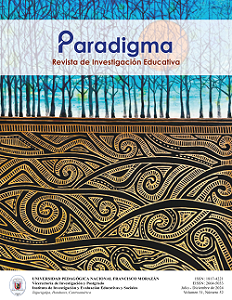Teaching strategies for developing reading comprehension in third and sixth grade basic education students
DOI:
https://doi.org/10.5377/paradigma.v31i52.19491Keywords:
teaching strategies, reading comprehension, methodology, evaluationAbstract
This research was conducted with the aim of understanding the teaching strategies that third and sixth grade teachers from five (5) basic education centers in the Central District use to develop their students' reading comprehension. At the same time, it aimed to identify the level of reading comprehension performance of the students they serve, in order to compare and analyze these variables. This project was carried out under a quantitative approach, it is transactional in nature with a descriptive scope, as it aims to observe and describe the variables as they are presented at a specific moment, providing a detailed picture of the phenomenon studied. The techniques used for data collection were: a questionnaire for student evaluation and a survey to obtain information from the participating teachers. The results show that, on average, both third and sixth grade students are at the "Needs Improvement" level, and that teachers in these grades use a variety of methodological strategies, mainly activities and resources for the development of literal and inferential reading comprehension.
Downloads
339
Downloads
Published
How to Cite
Issue
Section
License
Copyright (c) 2024 Universidad Pedagógica Nacional Francisco Morazán

This work is licensed under a Creative Commons Attribution-NonCommercial-NoDerivatives 4.0 International License.
Transfer of Copyright
- The author, when sending the work, states that it is his will to give the Universidad Pedagógica Nacional Francisco Morazán the patrimonial rights that correspond to him as the author of his work.
- The rights here assigned include all economic rights (Reproduction, transformation, public communication and distribution) and are given without limitation in terms of territory; This Assignment is given for the entire duration term established in the current legislation in Honduras.
- The cession of the aforementioned rights does not imply the cession of moral rights over it, because in accordance with the provisions of the Copyright and Related Rights Law, Chapter II, of the Moral Rights, Article 34, Article 25 , these rights are inalienable, imprescriptible, indefeasible and inalienable.
- The research work or document must be original and have been done without violating or usurping rights of third parties, therefore, the work is exclusively authored and owns the same.
- In the case of any claim or action by a third party, as to copyright on the work in question, the author must assume full responsibility for the rights assigned.
- Upon completion of the Rights Assignment Form, the author states that the work has not been published in another way, that the rights on the work have not been assigned and that no encumbrance or limitation on their use or use is imposed on them.








